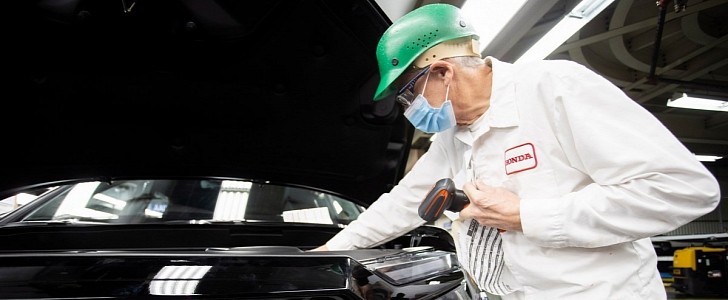The automotive industry is facing a lot of obstacles in 2022. After battling a global health crisis for the last two years and dealing with an industry-wide chip shortage, gas prices have skyrocketed due to the Russia-Ukraine war. On Thursday, the Japanese automaker said it would cut production in two plants due to a semiconductor shortage.
According to the carmaker, Honda will reduce production in two domestic factories by 10% through the end of March. Reuters pointed out that geopolitical uncertainty and global chip crisis are behind the move.
While oil and gas prices might not affect vehicle production directly, key gases such as neon and krypton supplied by Ukraine play a significant role in developing microchips. These minor hiccups combined are a production nightmare for automakers.
Last year in March, Honda temporarily cut production in all of s Canada and U.S. plants due to the industry-wide semiconductor crisis, harsh weather, and supply chain issues.
Honda is not the only automaker halting production. Last week, Ford stopped production at two U.S. plants due to a microchip shortage. According to the automaker, two of its plants in North America will be offline this week to provide more time to improve on the elusive part inventory.
According to industry insiders, the chip shortage will not necessarily end this year but will have eased off towards the end. TSMC’s Senior Vice President of Research and Development, Dr. Yuh-Jier Mii, believes the recovery will begin this year and take a span of 2 to 3 years.
The aftermath of the chip crisis falls on the consumer who no longer enjoys the luxury of discounts and incentives but has to pay above the sticker price for a new car.
While many people think the chip crisis was due to the global pandemic, industry experts believe it would have still happened due to an increased demand for technology that requires microchips.
While oil and gas prices might not affect vehicle production directly, key gases such as neon and krypton supplied by Ukraine play a significant role in developing microchips. These minor hiccups combined are a production nightmare for automakers.
Last year in March, Honda temporarily cut production in all of s Canada and U.S. plants due to the industry-wide semiconductor crisis, harsh weather, and supply chain issues.
Honda is not the only automaker halting production. Last week, Ford stopped production at two U.S. plants due to a microchip shortage. According to the automaker, two of its plants in North America will be offline this week to provide more time to improve on the elusive part inventory.
According to industry insiders, the chip shortage will not necessarily end this year but will have eased off towards the end. TSMC’s Senior Vice President of Research and Development, Dr. Yuh-Jier Mii, believes the recovery will begin this year and take a span of 2 to 3 years.
The aftermath of the chip crisis falls on the consumer who no longer enjoys the luxury of discounts and incentives but has to pay above the sticker price for a new car.
While many people think the chip crisis was due to the global pandemic, industry experts believe it would have still happened due to an increased demand for technology that requires microchips.






